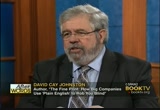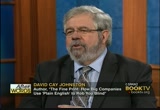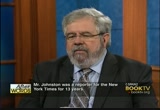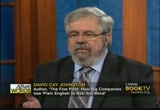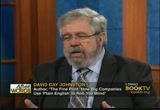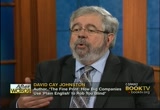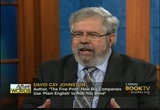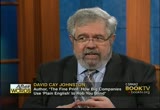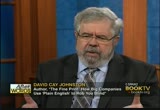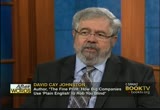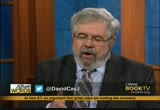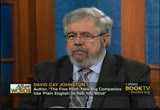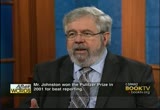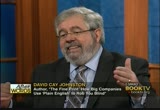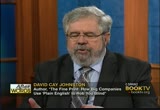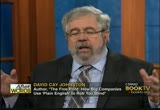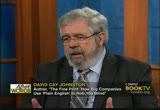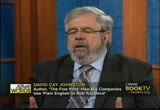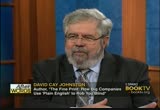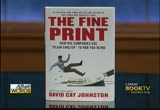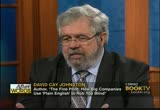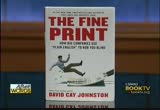tv Book TV After Words CSPAN November 12, 2012 12:00am-1:00am EST
12:00 am
>> up next on "after words," jayne o'donnell pic is a, david cay johnston the release, "the fine print" in this latest exposé, perfectly legal and free lunch numerous ways in which court rations systematically exploit the government. >> david come it seems to me the basic intention to focus rocketing taken the corporations and the government is pretty much letting them get away with it. people often say to reporters like you and i say this at the worst cases. it's really not as bad as you describe. i bet there's probably more examples. did you have trouble filling the spot? >> guest: no, i have enough material to do another book,
12:01 am
maybe two more books on the same thing. unfortunately, we keep in mind what adam smith said in the wealth of nations in 1776. the talk turns to a conversation against the public interest to lower wages. sorry number of big corporations have tried to work the rigors of market competition, create monopolies and duopolies, artificially raise prices, provide very poor service to other countries in the world that in a few cases but lives at risk and how we don't have a ballot system focus on competitive ones. >> now, we'll go through some of the specific examples and i think everybody probably has their favorites to jump out of them. but to you, what was the most egregious?
12:02 am
tell us a little bit about it. >> has been the most egregious story in the book is bob manning. manning is a 26 roofline in for the electorate power company in upstate new york on monday in february 1962, as he was coming down off the powerful, electricity got was a at first the pavement, paralyzed from the neck down. and about the next nice and when he called "the new york times" looking for help because they couldn't collect benefits 35 years later. but that's not really the egregious storytelling this book. the egregious story is the power company was sold. the insurance company was then sold and had a finding there were no refusal to pay benefits. i called them about that. he said to junot breed?
12:03 am
they say we don't pay attention to what's in the newspapers. i said what about all the complaints? they said they never been a fan of judicial ruling, so they give them a walk after refusing to pay. it is ultimately pay some of the money. an insurance policy was a warren buffet company. the nurse comes around and reshooting herself into botkin and five in sacramento, california and eventually goes to his home, which they have a right to do and the meanings are these wonderful people who adopted three children were their parents were killed in marvelous human beans. the nurse goes into bob sura and points to the blonde says i'd share the tnr? dnr means do not resuscitate. party of medics keeping you
12:04 am
alive when you have a medical emergency? is that asking him to die? is nurse, his doctor, all the people to solve the nurse to this under other actions were just appalled by this. well, warren buffett did know about this and wouldn't approve in the race. on the other hand, what does mr. buffett said so long as my managers the numbers as they see fit. it's indicative of the callousness going on, where we don't have that one or so focus on profit you could have a company go and say please die. >> host: but when we talked in your book about some of these industries being deregulated and certain the presidential campaign they talk about regulation in terms of democrats versus republican issues. but for more of these flaws, more of the problems created because of democrats or is this
12:05 am
not a party related issue? >> guest: there's one party in washington and the state cap will come of the party money. frankly if you are ever elected to congress, we have to behave like every member of congress says because they want to get reelected, which means that to listen to people who provide money to pay for campaigns restaurant office and it's not going to be mary smith. it's going to be representatives of big corporations and wealthy individuals who just a little change here to be fair. but they want to do is on level the playing field and support the readers of the market. either way, there's no such thing as deregulation. there's only reregulation. only new regulation. i'm not going to defend every regulation code that looks at the interest of the company and customers and other parties in the place with the system that
12:06 am
takes the consumer price. baseball regulations and everything is regulated and most of the regulations and federal code of regulations in the state were sought by corporations, business regulation of the defined playing field to prevent competitors and escape readers that the competitor market. in many cases regulations and statutes are written by the company. >> host: people don't believe it, but it happens all the time. everyone is in on it. >> guest: to have a lot more power and influence in the corporations. >> host: so a couple powerful phrases in the book were read
12:07 am
economy. you can attach a that number if you could explain a little more clearly. in a competitive market, government was set to rule and instruments to with liberalism adjustables as physicists figure out how to have a level playing field as possible. you have to keep trying to make sure the playing field is level how to allocate capital and to succeed. it's also natural tendency to hate towards monopoly or duopoly, or a couple successful firms keep getting bigger and bigger and removing competition. when that happens, once your monopoly or duopoly, you don't want to invest in innovation. you don't want to take risk. you just want to mind the market for right-thinking in which means earning profit in an economy. all of these rules and regulations in every shop tour
12:08 am
i'm sure you've read things you have not read in the news media. i show again and again the market is being. this is terrible and explains why we are in economic doldrums and my redundant job creation. >> host: let's go through some of these examples. we'll get back to some of the ones that explain stood out and i'll never forget as long as our lives. how about the internet? to have this right do we have the highest president and the world number 29th? explained, how did that come to be? >> guest: taxpayers and to set up by academics and military through its knuckled darpa, and so we began at number one.
12:09 am
back in the 90s, senator vice president's say we have this wondrous thing called the internet when browsers came along in 1995 and have what we all know is the internet. the telephone companies and cable companies on capitol hill said were going to have this television ad where an old geezer pulls into the sleep that hotel insisted the young woman behind the desk in the room service from the lobby. entertainment, she looks at insides, every movie ever made in every room. that's who we're promised. this was shot in the mojave desert. well, the rest of the world is doing that.
12:10 am
america ranks 29th down the speed of its internet behind such leading industrial world as moldavia and ukraine. we pay the highest prices in the world a fire. by one measure would pay 38 times the japanese pay for bit of information. if you buy triple play package, i have one in my home, you pay an average of texas in the u.s. $160. in france you pay $38 u.s. annika worldwide calling to 70 countries come not just the u.s. and canada. worldwide television, not just domestic. 10 times faster downloading and your painless and 25 cents on the dollar. all this other countries under and the fundamental principle in the chronology rather the key to economic growth of industrialization came along and you had to move heavy things like steel. the 20 century came along.
12:11 am
it was interstate highway programs and airports that are crucial to economic growth. now it's the information superhighway. the rest of the world is getting the information is deeper highway. as literally told by the chief pr person at ricin that was the phrase i'm not really used anymore. assume the company actually has fiber-optic to your home. but the companies are not wired the whole country. universal access, really high-speed internet lead to a even imagine what they are. if you build it, they will come. we are going to be left in the dust economically. and then these companies but to the state legislatures and they got all the subtle changes in the law that i tell about the fed will come you don't have to
12:12 am
have service. very few americans does since 1913 they have a legal right to a telephone. five states have repealed that law. florida, alabama, texas, wisconsin. i can't find a single newspaper clip. they do with things like lifeline access for disabled and poor people. they go well? needed near that happening. >> if they're that far away -- >> the three. what are the arguments as we don't have a monopoly anymore. this cable companies, telephone companies. under the rules in many places, you can have cable company and phone company weathco? running down your street. but when hundred units, were not quite larger building. if there's a building in north jersey this not been wired for four years, that building as
12:13 am
they come off residence. the advocates for the state of new jersey. when i wrote about that, i thought certainly some executive at ricin will say it's not politically smart to do to figure out how to get the people to wire their building. they didn't want damage done to it. they were told no, we don't negotiate control cyt. that's how much power these companies have. if the advocate for the state of new jersey kanka fiber-optic service and what hope do you or i or anybody listening habits plus every briton to take away your right and invest all the power in the company and then cut out the state regulators who were there to protect you. >> , to get to this at the end, what would she tell consumers? and i you recommend people involved politically. what can you do about it you do about it you do about it i was
12:14 am
at the i was at "the new york times" positioned to write solutions to express a bias. this focus was to propose solutions for what to do about it. all three of these books and at the same sentence. reform begins with you. my job as a journalist is to do the investigative work, explain to you so you can understand it. now it's your job to do something about it or live the consequences of it. >> if you are living in new jersey, which you do personally? >> i'd be complaining to the company or i could. i go to state legislatures have had this nice beautiful building is your position is they can punch holes with no regard for property or we don't get service. but make the rest of the legislature and get their attention. most of the lawmakers, both federal and state don't read the bills. they never have, never will.
12:15 am
and they do with the leadership since around and only handful of people actually get and unlearn what these things are about. there's no pushback. as consumer groups, government funded organization to look out for the consumer assaults private groups. then you get this one-sided development and does in syracuse i teach now when they weaken the law school graduate school of business property tax in one class, business regulation the other. everything in the lot today pretty much isn't hammurabi's code and social experience to business regulation to rule some loan, two defenses for white-collar crimes. these fonts were developed out of thousands of years of experience. what we're seeing now is corporations for a vitally i'm doing thousands of years of
12:16 am
human experience to their benefit but the overall economy. >> is there a solution with the state budget nature? shebang may be around the paid more? to the lobby restrictions be greater? >> guest: well, this is a really difficult problem. it strikes me as an solutions we should have an active discussion about his public finance lectures, may turn out in comments thrown out. the constitution gives you a right to lobby. the first amendment says petition does not require any response. everybody accepts the petition. i do think the lobby and in the state capitals and washington is that the founders had in mind because the company with
12:17 am
campaign contributions of the threat of contributions to other people if you don't play ball and they're the only people being hurt. so i think a fundamental reform of the campaign contribution system is important. in my last book of a i suggested we should put in place a set of rules that once you're elected to an office he can't work for the industry on committees involved with to pay a lifetime pension to remove you from the economy. i suspect costly and might be a lot cheaper than the things we see an outcome which are extracting hundreds of billions of dollars in peoples pockets of the market would never allow these corporations. >> back to the telecom industry, the remote controls, prophets on the remote control is fascinating. what is the process? a thousand? >> is just off the wall. draws its name from scotland and
12:18 am
of course discuss earthiness, that they had a monopoly cable provider whose church incredible prices. and he was sitting on the sofa, the couch potato was $5 a month. they built the municipal system. they will to cut prices dramatically and still make money on the system and that cut the price of the remotes to less than a dollar. you can buy a remote -- if you look at line after line of details to not notice it's really going on, you probably think 75 cents a month if they buy these things for a couple dollars and a factor in determining your cable box -- >> if that were the true tiered >> battery. five dollars a month is indicative of charging a rate of return of a thousand% over time. can do that if you're monopoly.
12:19 am
to be a monopoly in most cases it's because the government is to be a monopoly. >> is it still there? >> guest: would have been a serious effort by the private company and newt gingrich when he was speaker of the house in the 1996 act was being debated, set up a group, progress and freedom foundation to raise money to promote the public good. a fan but this is done with the money only because the process litigation. when it came before well-known, real conservative judge, he listens to the industry lawyer and says it sounds like you just don't want competition. since then, bosco has charged much lower rates in the surrounding monopoly providers
12:20 am
in the same thing is happening in with vienna and scottsboro, alabama and chattanooga, which is the fastest internet america just as a hundred years ago communities are wall street said we're not going to worry for electricity. iran in the sticks are hyatt profit margin. so that tom greeted them the municipal systems in overall people pay about a third less. they have fewer outages and by the way, even the big systems like the los angeles department of water and power sacramento, big systems pay salaries to their top executives in six figures is supposed to sound of the utilities now paying 30, $40 million a year for the same service and people pay higher prices. supermarkets sometimes is less efficient than multiple governments focused on betterment of the community. >> host: it seems they might
12:21 am
of been other examples of companies being far more competitive. >> guest: in sacramento california to start billing systems and immediately at&t cup races way down to nothing. as a notion of predatory pricing because it makes the assumption that traces everywhere. he cut prices in one location and take those losses to than the competitor out of business and keep them out of business by doing that and that's why we've seen very little real competition in this area. if i can shift gears on you a little bit, i lived in rochester, new york from a few bucks in the suburb. my neighbor's senate voted to raise their property taxes. and today because of that i have more money in my pocket. it's a good example of academic economics are not as simple as you'd think for a machine here in television shows. in the u.s., we have an
12:22 am
oligopoly to cherish immensely high prices on a show how to tell the government is a competitive market in recorded conversations that we got this fixed, we know how to rationalize the market, raise prices, even push competitors who don't want to raise prices to raise prices. a hundred raise taxes in my neighborhood and cut prices? we had about a different card garbage companies never did make a difference only diesel truck would come down the street. we created a refuge system and went to competitive bid. at the lowest price could one day a week, when chair, every single house on the street and my bill for garbage collection from around $600 a year down to less than half of that. so although we pay high taxes, i have more money in my pocket. paying higher taxes can make you richer depends on how the money
12:23 am
spent. it can make you poor, but can also send a thank you wealthier. >> an example of how consumers can make a difference. >> absolutely. we took action to create the sister. >> one of your solutions in the utility chat her with counterintuitive, like which were just describing. on the blatant dollars from consumers of the cfg -- >> guest: the utility in new jersey. >> host: could you explain that how eliminating the corporate tax? >> guest: let me deal with this first because half the state voted to get rid of traditional integrated utility and the power plant, transmitted and distributed to homes and offices and ran the whole thing top to bottom. in half the states to recover an i said no, we can have two hobby by an open market comprises
12:24 am
another 48% real terms since 1999 and this is the case of the market will actually decide to raise prices, not to lower prices. one of the companies was told she has to get rid of your power plant so do they have an open auction saw them in the market? no committee transferred from utility pocket to nonregulated pocket reminiscing to a same locations for missing people and same businesses, but not accompanied by bystrom itself. when they did this, the companies have been written off to plan. there's something called context of her account as fans have been written down, the money gets paid back from assistant interest-free loan. pay the taxes. would you like to have the interest and a billion dollars for the next 10 years? will be seen in new jersey did
12:25 am
this and i believe most of the other states forgot about the attempt. they said these plans are being sold in an increased price even though it's only been transferred to the same company. they argue both hamas, since they make customers pay income taxes to pay interest, the customers are paying twice this income tax. and they've never denied denied this. i've always said is a subtle matter. it's over. be careful to never denied that they pocketed all this money. the second part is the utility companies often have a holding company structure. so you have your local utility for water and natural gas, but it's increasingly owned by companies in spain and france because rules are favorable to make a profit. companies mostly i prefer money.
12:26 am
utility makes a profit of 11% after taxes pay the company. makes it dirty%. and those taxes charge at the highest possible rate, in many cases never get to the government. not a ten-year limit the interest of the billion dollars, but the holding company set up a mechanism market the money. when i expose this in 2002 to "the new york times," oregon passed a law that said give it to the government or give it back to the customers. general electric, no problem. northwest natural gas, no problem. one by warren buffett went to the legislature and said fair. they eventually got it overturned. what really goes on now is warren buffett collects the rate, collect income tax and
12:27 am
there's no evidence the income tax advocates to the government and therefore the company earns more than it's supposed to learn. to send us a principal block called just and reasonable from monopoly. the owner should earn a just and reasonable profit. the customers pay just and reasonable price. but if you say just and reasonable price and then he threw in the income tax and the company pockets that can announce an unjust and unreasonable price and the company is violating the underlying standard for regulation. and it's an enormous amount of money. the average electric is about 5% of your bill is these taxes. if you can collect 1 penny a day from everyone in america, the end of the year cohabit elion $100 million. wow, what if you collect a dollar a day? that you have $111 billion.
12:28 am
it doesn't take a lot of these deals in different industries before some money you and i are doing so well because a handful of people are doing extraordinarily well. >> host: one of the statistics that jumped out at me was from 1983 to 2010, the number of americans whose 30% utility workers fell 15%. that of course comes to mind. at an officer in washington d.c. is any worse, but every time there's a storm of this power to melissa for a long time. a friend of mine says he feels like he's in a third world country. he says in power so much. >> host: the washington d.c. corporate utility that's 18% of its money from the taxpayers, including the tax is supposed to go back to the government is a champion tax an american corporation are better than general electric. the really good at it. i've gone back for years. i've met and talked to them. they said upholding company
12:29 am
mechanism so they make off the tax system. one of the worst utilities when it comes to service when i read about this in the "washington post" because they got to be so that. either way, systems have generally good service record because they are run as a public service for the community rather than a profit. so pepco is not unusual in that regard. i go to the book and show how utilities are being hollowed out. largely people who are career utility people and i'm a fan of monopolies here comes that of understood in terms of service have been replaced by financial folks and they've been hollowing out these utilities. southern california, pacific gas and mike are reading pieces to replace our hopes on a 50 year cycle. the testimonies power poles on average. on average 50 years.
12:30 am
they replace poles on a 775 year cycle. they put up about three dozen polls a year, so the power poles today if nothing changes supposedly will have two last until 2775. now if you're a competitive business, you don't reinvest in the business. you don't replace equipment as it wears out. you go broke. if you're a monopoly utility, the disaster comes for a much powerful collapse for me so you need emergency rate increase. ..
12:31 am
that happened after these blackouts did they make a difference or is it just a lot of lip service? >> i think this is a fundamental problem the utility boards are insulated and when i first wrote about this in the early 1970's the utility boards that i dealt with at least had some people that were directly connected to the industry sometimes they get knowledgeable critics. they had a brilliant businessman who died recently and probably made himself a millionaire
12:32 am
before he died who were critics of the industry and thought about how do we get the rules to encourage the utilities to behave in a way that best benefits the overall economy. in the commission under governor schwarzenegger run by people from the utility industry, a lawyer from the cell phone industry, a finance your from the energy industry coming in by quote the editor of a little paper in california the only peter besides the l.a. times that's been tough on the utility industry whose says it doesn't stand for public utility commission because they are so unpopular he calls of the profit up keep commission. >> host: there are other examples of interesting to me but there's a section on the 401k and the retirement savings what do you find is
12:33 am
there a lesson that we can do as individuals if everybody knew how to invest well then they would pay the wages and for all of my education and knowledge i don't know how to do that i just spend less than you make. the efficient way to take care of people's old wage there is not peacekeeping is through defined benefit pension plans and you hear the industry saying let's get rid of these they aren't predictable. that's nonsense you can buy the pension plan call-up any insurance plan and say i'm this age here is how much i have and tell them your gender and get a blood test and we will give you so much a month for the rest of your life when you do it with large numbers what went wrong? companies after the employee
12:34 am
retirement income security act was passed in 1974 went to congress and they kept getting this little changed to not put in the appropriate amount of money. this is not a secret. we've had pensions going back four to 500 years but by getting all of these liberals who pays attention to these little rules can you imagine there is a rule called subsection 14 bea 11, c they are trying to rewrite the order of the conjunction. host but that isn't going to play well. >> guest: they get these rules to underfunded these things and rate them. i have a pension that has been rated and probably will die before i do, so the 401k was by the financial services to allow executives to save extra money and it blew up into this big huge system.
12:35 am
we need to have a rational policy that recognizes that people need to have money put away for their age and have a reliable income stream and not run out of money that when the average worker in america doesn't have mayor enough money what you are going to see is more and more people in the 70's and 80's working. i don't plan to retire but what about my brother was a ditchdigger and the reason people get to work each day is he was down in the call for getting the triet of there's of the road didn't flood? now he is busted up and can't work and we have to bet you could think about the system and not our individual situations. >> host: is there an issue i didn't touch on? we have digging into goldman -- >> guest: let me do goldman and wells fargo.
12:36 am
when detroit was bailed out by washington everyone took a hair cut. the ceo and the janitor. executives lost half of their deferred government guaranteed pensions. when wall street was built by the previous administration, nothing changed and a lot of people heard the story how goldman sachs had $15 billion about a third of its capital with aig and made a bet that would pay off pennies on the dollars they would have lost ten or 12. instead in a meeting of government leaders and putting the treasury secretary who happened to be the former chairman and then on government person in the room they made a decision that led to 100 cents on low dollar being paid to goldman there's another deal made that goes through the analysis that was a 5 billion over gift to goldman how did
12:37 am
they build it? you're tax payer dollars in large part paid for that building. taxpayers are paying your bills it's easy to make a profit so that is one of the things minimally explored and wells fargo for example is deals with a woman in d.c. a bus driver, school bus driver who needed a car and got talked into paying three times the value of a used car by a car salesman. wells fargo financed the deal she would have paid almost $30,000 for the 6,000-dollar car for interest. she got pregnant and had to go on disability. they said we are going to take your house. under the arbitration agreement that everybody signs, you sign up for a bank account you give up your right to sue and are put into arbitration. the arbiters know that the bank
12:38 am
and the car dealer and others come to you every day so it's called the repeat play your problem in making happy the people you are up against to hire them again and again. two lawsuits that the american university took this case and very creatively ran with it and the woman didn't have to pay and wells fargo paid the damage but what did they say? we will take your house. all of this because the 1925 federal arbitration act nobody in this audience has heard of the law was passed to the companies that had disputes across the state line and wanted to go to arbitration and had the option of doing so. the supreme court particularly the people i call the radical a historical members of the court, scalia, thomas twisted this because they do numerous things
12:39 am
claiming that their god. of the federal arbitration act has currently interpreted came up with a vote today not the company's but you and me and then all sorts of things the would make the system efficient i don't believe we would get a single vote for members of congress regardless their political or economic use no one would vote for this if it came up today and it's used by corporations against consumers and small-business owners and franchise agreements and other areas to increase their power over their customers. >> host: you mentioned you talk a bit about dodd-frank and it's come up recently with it should be repealed and -- >> guest: i am not a fan of dodd-frank. the best regulation is the least regulation that encourages behavior and rewards and that
12:40 am
punishes vicious behavior. we had an excellent law called glass-steagall when it was enacted up until that was repealed we had almost no bank failures in the country certainly after world war ii to read and glass-steagall had a simple principle you want to be in the gambling business and underwrite securities and bonds or as we do today sell derivatives and 90 present is not investment banking to factories and offices it is derivatives trading. but you can't be in the insurance business if you do that and a banking and insurance are the same thing the differences you make a deposit to an insurance company you withdraw you don't go to the withdrawal if your house doesn't burn if you buy fire insurance. when the glass-steagall was repealed these were all mixed and this is a terrible mistake if we go back to the basic
12:41 am
principle this business has to be separate from this business a lot of our problems will go away and we want to have regulation based on sound principles rather than micromanage companies which we can't do. host could use it was interesting because what you said before when we were on the air people might think you like a lot of regulation but you don't. one side of the pub local spectrum and you're not. >> guest: i'm a registered republican and with a tiny business that my sons run so i also not anticorporation to read what i am in favor of his understanding what corporations are, understanding what economies are and what we have learned from thousands of years of human experience and getting the rules right so the economy benefits from having a system you want people to make profit by saying go die or put your life in danger?
12:42 am
no, we don't want that. we want the system where the whole economy prospers and you make them if you take risks but we have to put reward and response but the. what did we say to the people but. people took the money, and then you sell them on to wall street in a way that when the loan sours it can't be sent back to the bank said you've taken the reward and who bottles that? fannie and freddie mac were late in the beginning that there were criticized for refusing to buy these kind of products. as goldman sachs, lehman brothers and bear stearns.
12:43 am
now you get hit twice. >> host: you volunteered your political leaning but as you are listening to the campaign rhetoric, do you think one side -- this obama seems more likely to solve the problems? >> guest: the coverage has nothing to do with what is going on here at all. the romney ryan plan with the eliminate the taxes on capital and from the wood for anybody with cough $.5 million of wealth and up to that he would have no taxes on capital the people of that would be taxed. that is a system that says we're going to let the already rich with tax-free and put the consumption of large labor and for the policy i believe it would lead to wealth and the situation where the
12:44 am
entrepreneurial spirit is stalled and killed because it's the guy that group like me with no money and makes the success of himself with a silver spoon in the not so you'd like 18th-century france and 18th-century france your economics were determined by who you picked as your parents and i mean that to sound just as of serve as it was coming your birth quarter and if you were not, too bad for you. obama is suddenly the most business friendly person in history and i realize people listening to this are going what 100% expenses when a company buys new equipment that's a factory and we have to write it off every three to eight years. you could write 100% of today that the best george bush was 30% bonus, 40%.
12:45 am
the current economic firemen it may be a good policy to encourage more capital investment that we need to discuss the corporate income tax and how we want to make it work. secondly, obama gave all these tax cuts to small-business under the big stimulus. the tax cuts are not stimulus they are antistimulus but he voted for all these things and the best indication espy during the savings and loan crisis, 3,000 felony convictions, a thousand of them insiders, the heads of savings-and-loan. how many have we seen since the crisis in 2008? that's right. and the statute of limitations is rapidly running out and that's act so literally incredible. we are going to go after these people that fly the, cheated and steeled but if you read the
12:46 am
financial crisis inquiry report that gave about $10 million, and 80 million or $100 million no one's been able to poke a hole in that report and what did congress do? the round file because they didn't want to hear it. so, i think fed obama has been soft on dealing with these matters in business and i think that he's fought much too much about what wall street wants and they're basically on steroids and george w. bush promised they would be in better off. per person inflation adjusted
12:47 am
36% from 2000. to low-income them. we need a fundamental discussion about the economy and we are not getting it this election. >> host: he mentioned the corporate income tax rate. in the economy america has the 50's, 60's, 30 afford these it is built mainly of by. in the global economy you have this our literature replacing american workers in china and vietnam the best-selling is the corporate income tax is borne by the workers to lower wages. the the argument for. there's reason for the study and
12:48 am
examining 1945 connected with tax cuts comparing different states and counties. statistically significant measure will affect economic growth tax cuts for the majority leads to higher growth. aggregate demand that money in your pocket you can spend to buy things. in our little business we can hire more workers if we had more business they are not willing to hire more. we hire the workers when we have more work to do and the more. the interview when rich people exploit. >> guest: .
12:49 am
imagine that your parents had left you a billion dollar fortune you could live tax-free. you go invested in the issuance that don't pay a dividend and if you get interest to takes to the to take the tax on bonds he won't pay on that to read in a billion dollars to make 5% you will make 50 million the first year and say i have a lavish lifestyle now we have the family plaine and private schools and the sand that. he basically went to $10 million paid interest at the end of the year. your fortune has now grown to a billion and 50 million use it to the bank 10 million next year. the fortune and grows to 1.1 billion. you spend 20 million plus about 300 -- five those $9 on interest. you would be better and better off not contributing at all to the cost of the government. if you were a hedge fund manager
12:50 am
or private equity manager has romney was through 2001 when he was the owner of been capital. government rules allow you to be for all of your income back into your fund and chemotaxis. you might have other investments in things and lucrative in comes pretty much tax-free. fighting if you have on taxed capital gains and you borrow against them and pay taxes on them it's no different than selling them if you already sold something and you made a net profit of a billion dollars you have that billion dollars but the first thing you do is assume any taxes on them to read the second fundamental reform we call the single company if you look inside any big company, general electric, "the new york times," it's really hundreds and sometimes thousands of little companies. they are. it's a separate corporation. that sum for purpose of legal
12:51 am
liability. but the tax purposes we should say single company is happening. we don't care that you made tan shoes in hanoi, shift them to america and sold them for tax purposes you can take them to the cayman islands because use of a paper company and then to yourself and america you pay no taxes in america or hanoi you put your money in the cayman islands where you pay no taxes. they would say do it any way you want we don't care but economically they need this and you have to pay tax on that. if we did that we could lower tax rates and eliminate the unfairness of the multinationals over domestic companies. that's mostly the mom and pop's the people like me who have a little business. that would be an important reform. >> host: let's go through some of the other solutions you brought to be covered with
12:52 am
consumers can do to really explain that a little bit more. people should get active in their communities -- >> guest: we should write brief letters to the editor, called a radio shows. it's a good idea if people would coordinate and say here's a question we want to ask your congressmen when they try to dodge say you didn't answer that and -- >> host: members of congress? >> guest: yeah some of them a lot, some of them not at all, senators and others. people should contribute to the organization that represents their interests. one of them that i quoted a utility lawyer that's worked for the utility's, for consumers who is an administrative judge in oregon he says deutsch the company seek a rate increase the should have to put a dollar for the opposition. then the company knows all the
12:53 am
info and you don't of the industrial, commercial customers will have some voice. >> host: are they doing a good job on this? >> guest: public citizen's has an energy group that pushed this. there is a group called term, the utility reform network it's been around for 30 some years. the citizens utility board there is one of those i believe in illinois. here in washington the former general counsel has been trying to get the regular tour commission to stop being a complete tool of the company's a regulates and they have it every turn blocked in saying we don't have to listen to what you say or what facts you come up with a total disregard for the consumer and what happens is people come from the industry and they leave and they become executive said
12:54 am
the country they disbanded your money to. >> host: >> guest: i see you go till the congressman this because i can't talk to him for a year. >> host: said that's what consumers can do. would you like to see state legislatures to on the issues clacks would be the important things. >> guest: the consumer advocate's office may be funded as much as its report to the corporation spent on lobbying you would get some balance because they're getting not just your right to the telephone taken away but rewritten to say we don't have to provide service to anybody and you have no rights at all anymore you are at our mercy it of the market will take care of you. not always that is in the job of the market choregus awaiting we need to do this in new jersey
12:55 am
and the only state that has the tax dedicated to the poor and the casino industry donald trump and the rest of the casino industry wanted that money. they got a very. the industry of 300 some million more at the time i looked into this. it's gone up since then. dedicated to help the poor and gets turned off to people that are so well the the drive casinos. the research i did about what's going wrong and the attacks on the competitive markets and the rise of the monopolies and duopolies tree and you get to leverage one against another with fixed financial profits and damage the economy.
12:56 am
>> host: this is the third which won the investigative reporting at the year award came out in late 2003 and still uses the textbook and the economics haven't changed. koza rot taxes. there are companies that do so that i name and identify and there's been some movement on that. they want which damages the competing markets and employees in the target's. those turned out to be tough
12:57 am
179 Views
IN COLLECTIONS
CSPAN2 Television Archive
Television Archive  Television Archive News Search Service
Television Archive News Search Service 
Uploaded by TV Archive on

 Live Music Archive
Live Music Archive Librivox Free Audio
Librivox Free Audio Metropolitan Museum
Metropolitan Museum Cleveland Museum of Art
Cleveland Museum of Art Internet Arcade
Internet Arcade Console Living Room
Console Living Room Books to Borrow
Books to Borrow Open Library
Open Library TV News
TV News Understanding 9/11
Understanding 9/11
